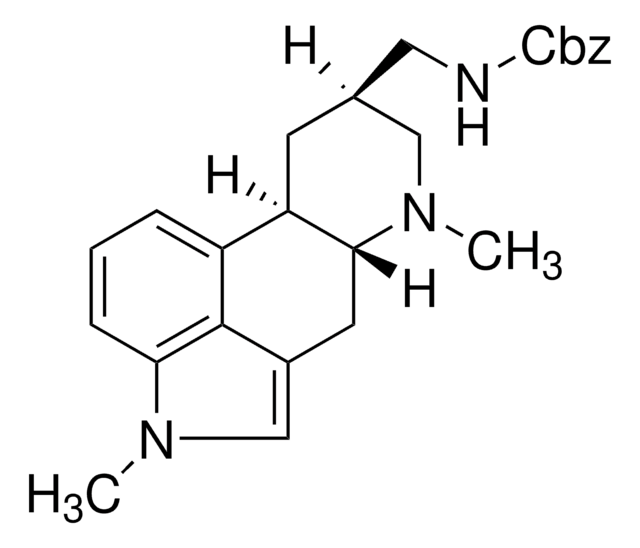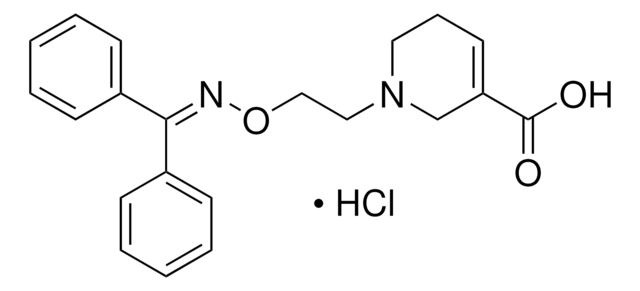S1069
(S)-SNAP-5114
≥98% (HPLC), solid
Synonym(s):
(S)-1-[2-[Tris(4-methoxyphenyl)methoxy]ethyl]-3-piperidinecarboxylic acid
About This Item
Recommended Products
Quality Level
Assay
≥98% (HPLC)
form
solid
optical activity
[α]/D -8 to -13°, c = 1 in chloroform-d
color
white
solubility
DMSO: >5 mg/mL
H2O: insoluble
storage temp.
−20°C
SMILES string
COc1ccc(cc1)C(OCCN2CCC[C@@H](C2)C(O)=O)(c3ccc(OC)cc3)c4ccc(OC)cc4
InChI
1S/C30H35NO6/c1-34-26-12-6-23(7-13-26)30(24-8-14-27(35-2)15-9-24,25-10-16-28(36-3)17-11-25)37-20-19-31-18-4-5-22(21-31)29(32)33/h6-17,22H,4-5,18-21H2,1-3H3,(H,32,33)/t22-/m0/s1
InChI key
VDLDUZLDZBVOAS-QFIPXVFZSA-N
Biochem/physiol Actions
Features and Benefits
Signal Word
Warning
Hazard Statements
Precautionary Statements
Hazard Classifications
Eye Irrit. 2 - Skin Irrit. 2 - STOT SE 3
Target Organs
Respiratory system
Storage Class Code
11 - Combustible Solids
WGK
WGK 3
Flash Point(F)
Not applicable
Flash Point(C)
Not applicable
Personal Protective Equipment
Certificates of Analysis (COA)
Search for Certificates of Analysis (COA) by entering the products Lot/Batch Number. Lot and Batch Numbers can be found on a product’s label following the words ‘Lot’ or ‘Batch’.
Already Own This Product?
Find documentation for the products that you have recently purchased in the Document Library.
Articles
DISCOVER Bioactive Small Molecules for Neuroscience
DISCOVER Bioactive Small Molecules for Neuroscience
DISCOVER Bioactive Small Molecules for Neuroscience
DISCOVER Bioactive Small Molecules for Neuroscience
Our team of scientists has experience in all areas of research including Life Science, Material Science, Chemical Synthesis, Chromatography, Analytical and many others.
Contact Technical Service









